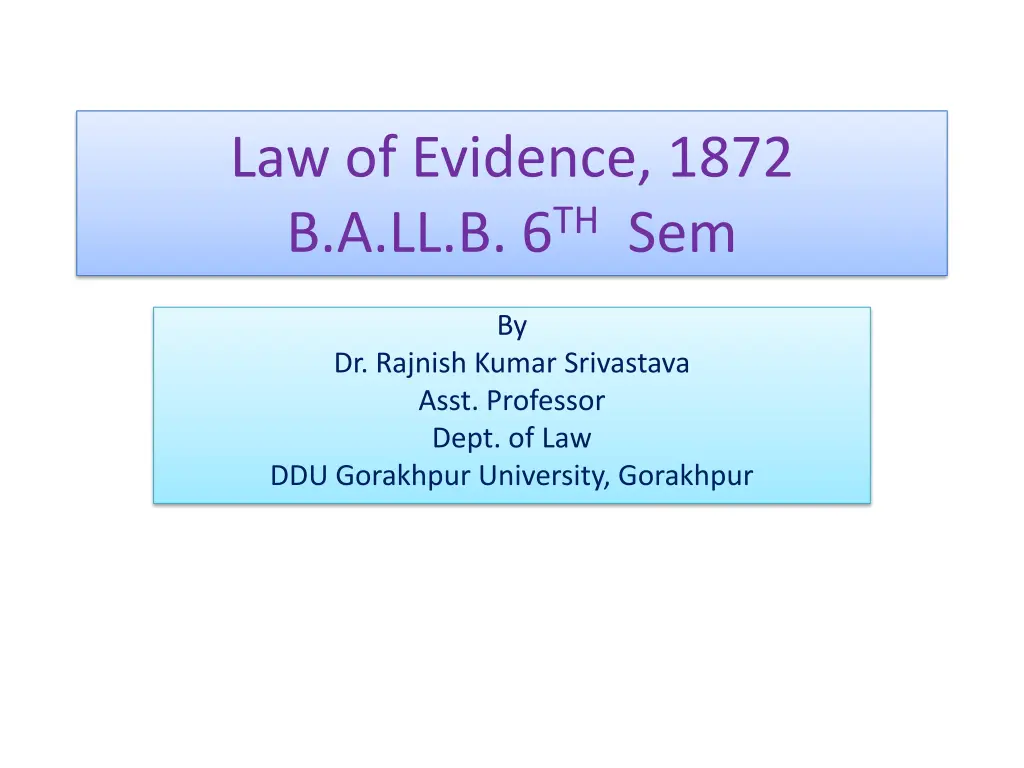
Law of Evidence and Relevancy in Judicial Proceedings
Understand the importance of relevancy in judicial proceedings as it pertains to proving facts before a court. Explore the classification of relevant facts and the admissibility of evidence based on Section 5 of the Law of Evidence Act, 1872, with insights on sections 6 to 55. Discover how evidence may be presented for facts in issue and relevant facts, while ensuring adherence to legal provisions concerning civil procedure.
Download Presentation

Please find below an Image/Link to download the presentation.
The content on the website is provided AS IS for your information and personal use only. It may not be sold, licensed, or shared on other websites without obtaining consent from the author. If you encounter any issues during the download, it is possible that the publisher has removed the file from their server.
You are allowed to download the files provided on this website for personal or commercial use, subject to the condition that they are used lawfully. All files are the property of their respective owners.
The content on the website is provided AS IS for your information and personal use only. It may not be sold, licensed, or shared on other websites without obtaining consent from the author.
E N D
Presentation Transcript
Law of Evidence, 1872 B.A.LL.B. 6THSem By Dr. Rajnish Kumar Srivastava Asst. Professor Dept. of Law DDU Gorakhpur University, Gorakhpur
Relevancy of Facts Relevancy of fact deals with the question that what facts can be proved in judicial proceedings before a court. We can enumerate various kinds of fact which are declared to be relevant.
They can be classified as under: 1- connected facts (sec 6-16) 2- Admissions and confessions (sec 17-31) 3- statements made by persons who can not be called as witness in the court (sec 32-33) 4- statements made under certain special circumstances (sec 34-39) 5- judgments in other cases (sec 40-44) 6- opinions (sec 45-51) 7- character of the parties (sec 52-55)
Section 5- Evidence may be given of facts in issue and relevant facts Evidence may be given in any suit or proceeding of the existence or non- existence of every fact in issue and of such other facts as are hereinafter declared to be relevant, and of no others.
It means- This section declares that in a suit or proceeding evidence may be given for existence or non-existence of- 1- Fact in issue, and 2- Relevant Fact This section excludes everything which is not declared relevant under this Act in section 6 to 55
Section 136 When evidence of any fact, the Judge may ask the party proposing to give the evidence in what manner the fact, if proved, would be relevant; and the Judge shall admit the evidence if he thinks that the fact, if proved, would be otherwise. either party proposes to give relevant, and not
Explanation of sec 5 This section shall not enable any person to give evidence of a fact which he is disentitled to prove by any provision of the law for the time being in force relating to civil procedure
For example If a suitor does not bring a bond with him, on which he relies, at the first hearing of the case. This section does not enable him to produce the bond or prove its contents at a subsequent stage of otherwise than in accordance with the conditions prescribed by the Code of Civil Procedure. the proceedings,
